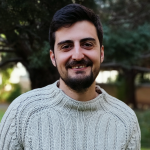Carlos Martín
Professor
Group Leader
Carlos Martin MD, PhD, is Professor of Microbiology at the University of Zaragoza. He has made major contributions in mycobacterial genetics in the last 30 years and his main activity at the present is focused to decipher the mechanisms of virulence on M. tuberculosis regulated by PhoP and its application in the development of new vaccine candidates against TB. He and his team discovered the live attenuated vaccine MTBVAC. He actively participates as scientific adviser with Biofabri and TBVI in the different steps of the clinical development of MTBVAC as a new TB vaccine.

Jesús Gonzalo-Asensio
Associate Professor
I am a passionate for microbiology since I was a child. Degree in Biochemistry (2002) and PhD by the University of Zaragoza (2006). Currently, Associate Professor in Biotechnology. My main achievement is the construction and molecular characterization of a new vaccine against tuberculosis: MTBVAC (from M. tuberculosis Vaccine), which is today in human clinical evaluation. I have performed stays in Institut Pasteur (Paris), McGill University (Montreal) and National Center for Biotechnology (Madrid).
I currently work in three main research lines as principal investigator: i) to continue deciphering the MTBVAC vaccine by omics approaches ii) to understand the host-pathogen adaptation in the context of the evolutionary scenario of the M. tuberculosis Complex iii) to identify anti-virulence therapies as a novel alternative to classic antimycobacterial drugs.
I envisage genetic manipulation of mycobacteria as a powerful tool for potential biotechnological applications. Besides mycobacterial research, I am professor in subjects related to microbial biotechnology and genetic engineering, and I perform several dissemination activities.

Nacho Aguiló
Senior scientist
In 2009, I incorporated to the Mycobacterial Genetics Group from University of Zaragoza, led by Prof. Carlos Martín, as Post-Doctoral immunologist in the characterization of the novel live-attenuated M. tuberculosis vaccine MTBVAC (Arbues et al, 2013, Vaccine). I have actively participated in the different steps to support the development of this vaccine: from vaccine construction and preclinical characterization to clinical development. I coordinated the preclinical mouse experiments required by Swiss Health authorities (SwissMedic) to obtain the authorization to bring MTBVAC into first-in-human clinical trial. In this way, MTBVAC was the first (and up today the only) M. tuberculosis-based vaccine entering into clinical trials (Spertini et al, 2015, Lancet Resp Med). I was involved in the clinical protocol preparation of the phase Ib, performed in South Africa (Tameris et al, 2019, Lancet Resp Med), as well as the phase IIa, which is currently ongoing in adults and neonates. At present, I am also involved in the preparation of the phase III efficacy trial, expected to start in 2022. Remarkably, the results derived from my manuscript published in Nature Communications in 2017 (as senior author) represent the basis to to design an assay to differentiate MTBVAC-vaccinated and tuberculosis-infected individuals.
Since 2016, I lead my own lines of research, based on the search for novel alternative immunotherapeutic uses for live tuberculosis vaccines in diseases different from tuberculosis, including cancer and allergies. I am interested in the memory response of the innate immune system, which has been termed trained immunity, and the stimulation of this response by vaccination. Considering the multiple roles of the innate system both in health and disease, manipulation of this type of immunity in the long-term could have multiple applications for both infectious and non-infectious diseases.
In 2009, I received the Extraordinary Doctorate Prize of the University of Zaragoza. In 2016, I was awarded with the Early Career Scientist Recognition given by CTVD (Collaboration for TB Vaccine Discovery), a consortium for the search of TB vaccines based on Seattle (USA), funded by Bill and Melinda Gates Foundation. In 2019, I received the “Rafael Gómez-Lus” award from the Royal Academy of Medicine of Zaragoza, for the best National publication in microbiology.

Nacho Aguiló
Margarita Salas Post Doctoral Fellow
Margarita Salas postdoctoral fellow with more than 7 years of experience in different areas and centers. Extensive knowledge in Molecular Biology, Cancer, Aging, Evolution, Bioinformatics and Next-generation Sequencing technologies.
He is currently conducting a research project in Mycobacterial Genetics Group, implementing single cell transcriptomics techniques, with the aim of understanding the tumor and immune microenvironment present in non-muscle invasive bladder cancer.

Claudia Guerrero
PhD Student
I studied Biotechnology at the University of Zaragoza. After that, I got a Master’s Degree in Molecular and Cellular Biology. Currently, I am doing my PhD on “trained immunity”. I am focused on the use of live attenuated tuberculosis vaccines and their application to therapeutic use in diseases with immunological component such as infectious diseases or cancer.

Elena Campos Pardos
PhD Student
I am one of those persons who share these words by Marie Curie: “science has great beauty. A scientist in his laboratory is not only a technician: he is also a child placed before natural phenomena that impress him like a fairy tale.”
Since I was a child, I felt tremendously impressed and attracted by science. I graduated in Biotechnology at the University of Zaragoza and later, I finished a master’s degree in Molecular and Cellular Biology at the same University. After this university period, my scientific interests turned around genetics, genetic engineering and microbiology, among others. For this reason, and because I wanted to start a scientific research career, I made the decision to start my PhD in 2018 by obtaining a FPU research grant from the Spanish Ministry of Science, Innovation and Universities in the Group of Mycobacterial Genetics of the University of Zaragoza, under direction of Dr. Jesús Gonzalo Asensio and Prof. Carlos Martín.
In this context, my area of research is focused on studying the molecular genetics and the virulence mechanisms of MTBC (M. tuberculosis Complex) pathogens, as well as understanding the host-pathogen adaptations in the context of the evolutionary scenario of the MTBC. Specifically, in my PhD project I am exploring the implication of host metabolites in M. tuberculosis virulence and its possible role as modulators of the pathogenicity of this pathogen, as well as its influence in the adaptation to the host. For this purpose, we use genetic engineering and synthetic biology techniques, in addition to diverse molecular biology tools and omics approaches.

Eduardo Moreo
PhD Student
I first become interested in immunology in my BSc and specially when working in my MSc Thesis, in which I studied the interplay between inflammatory immune cells and intestinal function in the context of ulcerative colitis.
Since 2019, I am conducting my PhD in the Mycobacterial Genetics Group under the supervision of Dr. Nacho Aguiló. Currently, my work is focused on understanding the mechanisms by which live attenuated mycobacteria, as BCG or MTBVAC, are capable of inducing antitumor immunity in mouse models of bladder cancer. Specifically, we are studying this cancer therapy both from the point of view of the bacteria, identifying genes required for optimal efficacy, and from the point of view of the host, trying to understand immunological pathways and cell types required for its success.

Juan Calvet
PhD Student
As long as I remember, genetic engineering has been one of my favourite topics. When I was a child, I wondered how genes work and how scientists could study them. Now, after my graduate in Biotechnology and master’s in Molecular and Cellular Biology, I am giving my first steps in the thrilling world of the Synthetic Biology of the fastidious pathogen M. tuberculosis.
In my PhD, I am developing new tools to trace M. tuberculosis virulence. I am working with PhoP, the key regulator of M. tuberculosis virulence. PhoP regulates the following phenotypes: synthesis of immunomodulatory lipids; secretion of the main virulence factor, ESAT-6; and secretion of immunodominant antigens. Since the PhoP-regulated genes responsible for these phenotypes are well-known, my objective is to construct genetic tools reporter of the PhoP activity. The gene of the Green Fluorescent Protein (GFP) is placed under control of PhoP-regulated promoters, so that fluorescence is proportional to PhoP activity.
These reporter tools can be applied for the search of small molecule inhibitors of PhoP, which act as anti-virulent therapies. This is the ultimate goal of my PhD project, since development of innovative therapies to treat tuberculosis that could act synergistically with classical antimicrobial are urgently needed.

Ana Belén Gómez
I am a Laboratory Technician and I have been working in the Mycobacterial Genetics Group since 2000. I started working on molecular typing of Mycobacterium tuberculosis strains, molecular typing of Legionella pneumophila and then I started working with cell lines.
I am currently supporting the evaluation of the efficacy of the tuberculosis vaccine MTBVAC at the immunological level, in addition to the maintenance and experimentation with cell cultures and tuberculosis.
Trained in Biosafety in accordance with the training requirements of UNE-CWA 16335: 2014 certified by the National Center for Biotechnology.
Training in Animal Experimentation; function of carrying out procedures (function C) and function of euthanasia of animals (function B), receiving training by the Department of the Environment and Local Administration and Spatial Planning of the Community of Madrid.

Santiago Uranga
Graduated in Veterinary Medicine from the University of Zaragoza, I completed the Master’s Degree in Initiation in Veterinary Science Research. I also have the course Animal Protection and Experimentation for Researchers, thanks to this I have been working on experiments with mice for 10 years, in the study of tuberculosis vaccines. I am in charge of the level 3 biosafety mouse facility assigned to the Mycobacteria Genetics Group at the Center for Encephalopathies of the Faculty of Veterinary Medicine in Zaragoza, as well as the person in charge of the group to coordinate experiments with mice in the CIBA animal facility. Mainly I advise and share with the thesis students the realization of the different techniques for the experimental procedures in vivo.
Other previous jobs I have had are: Laboratory Technician in a DNA Sequencing Service; Slaughterhouse Official Veterinarian; Microbiology laboratory officer; Watchman…

Dessi Marinova
Dessislava (Dessi) Marinova holds a Bachelor’s Degree in Science (from McMaster University (Canada), a Masters in Molecular and Cell Biology and PhD in Medicine on the Development of MTBVAC from University of Zaragoza. Since July 2008, Dessi has been actively involved as a tuberculosis vaccine project manager on the preclinical/regulatory, GMP and clinical development of MTBVAC from the lab bench to first-in-human clinical evaluation (2008-2012) inside European TB vaccine projects coordinated by the Tuberculosis Vaccine Initiative (TBVI) ( www.tbvi.eu) and thereafter, on the clinical development of MTBVAC in TB-endemic countries. Since the beginning of the project, MTBVAC development has always been and continues being in close collaboration with the Spanish Biopharmaceutical company, Biofabri (Zendal Group, www.zendal.org ), which is the industrial developer and exclusive licensee of MTBVAC, as well as in collaboration with TBVI. To date, MTBVAC has been successfully evaluated in two Phase 1 clinical trials in healthy adults (Phase 1a) in Switzerland and in healthy newborns (Phase 1b) in South Africa, two dose-defining Phase 2 trials in South Africa, namely a Phase 2a in newborns and a Phase 1b/2 in healthy and
latently infected adults with TB in South Africa. In Oct 2022, MTBVAC entered a Phase 3 efficacy evaluation in newborns in Sub-Saharan Africa.


